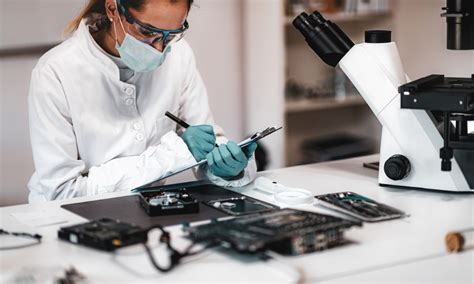Are you fascinated by crime-solving and the inner workings of the criminal justice system? Do you have a keen eye for detail and a passion for unraveling mysteries? If so, then a career in forensic science may be the perfect fit for you. In this blog post, we will delve into the intriguing world of forensic science and explore the mindset, skills, and qualifications required to pursue a career in this field. From mastering the art of crime scene investigation to delving into the intricacies of forensic laboratory analysis, we will uncover the essential components of a career in forensic science. Whether you are considering a degree in forensic science or are already on your journey towards becoming a forensic scientist, this blog post will provide valuable insights into the challenges and rewards of this fascinating profession. So, let’s gather our detective mindset and embark on a journey into the captivating world of forensic science.
Table of Contents
Understanding the Role of a Detective
When it comes to solving crimes, detectives play a crucial role in the criminal justice system. These individuals are responsible for investigating crimes, analyzing evidence, and gathering information to ultimately bring criminals to justice.
A detective must possess keen observation skills and the ability to think critically in order to piece together the details of a crime. They often work closely with other law enforcement professionals, such as forensic scientists, to collaborate on solving complex cases.
Furthermore, a detective must have excellent communication skills, as they often need to interview witnesses and suspects to gather relevant information. Additionally, they must be well-versed in the laws and regulations surrounding criminal investigation and must be able to testify in court when necessary.
Overall, the role of a detective is multi-faceted and requires a combination of intelligence, expertise, and dedication in order to effectively uphold the law and protect the community.
Exploring the Fascinating World of Forensic Science
Forensic science is a captivating field that combines science, law, and technology to solve crimes and bring criminals to justice. As a forensic scientist, you will be involved in analyzing evidence, reconstructing crime scenes, and presenting findings in court, making it an exciting and impactful career choice.
One of the most intriguing aspects of forensic science is the wide range of disciplines it encompasses. From DNA analysis and fingerprint identification to ballistics and toxicology, forensic scientists are trained to investigate every aspect of a crime, leaving no stone unturned in their pursuit of truth and justice.
To embark on a career in forensic science, individuals must possess a thirst for knowledge, exceptional attention to detail, and a strong understanding of scientific principles. The ability to remain objective and impartial in the face of grisly crime scenes is also crucial, as forensic scientists must handle sensitive and confronting evidence on a daily basis.
Furthermore, in addition to their scientific expertise, forensic scientists must also possess excellent communication and teamwork skills, as they often collaborate with law enforcement agencies, legal professionals, and other experts to solve complex cases and ensure that justice is served.
Unveiling the Mindset Required for a Career in Forensic Science
When pursuing a career in forensic science, it is essential to possess a specific mindset that sets individuals apart in this fascinating field. To excel in this career, one must possess a keen eye for detail, a natural curiosity, and a passion for problem-solving. In addition, critical thinking and analytical skills are crucial to effectively analyze evidence and draw conclusions in criminal investigations.
Furthermore, individuals pursuing a career in forensic science must have the ability to remain objective and unbiased when examining evidence, as the accuracy of their findings can have a significant impact on the outcome of criminal cases. The capacity to work well under pressure and in high-stress situations is also paramount, as forensic scientists often work on cases with high stakes and tight deadlines.
Moreover, possessing strong communication skills is crucial in this field, as forensic scientists frequently collaborate with law enforcement professionals, legal experts, and other specialists to convey their findings and provide expert testimony in a court of law. Finally, a commitment to integrity and ethics is fundamental, as forensic scientists must adhere to strict protocols and uphold the highest standards of professionalism and honesty in their work.
In conclusion, the field of forensic science demands individuals with a unique mindset characterized by attention to detail, critical thinking prowess, objectivity, effective communication, and unwavering ethical integrity. Those who possess these qualities are well-equipped to navigate the complexities of forensic investigations and contribute to the pursuit of justice through their work.
The Essential Skills and Qualifications for Aspiring Forensic Scientists
When considering a career in forensic science, it’s important to understand the essential skills and qualifications required for success in this field. One of the key skills for aspiring forensic scientists is attention to detail. Forensic scientists must be meticulous in their work, as even the smallest oversight can have significant consequences in criminal investigations. Additionally, strong critical thinking and problem-solving skills are essential, as forensic scientists are often required to analyze complex evidence and draw conclusions based on limited information.
In terms of qualifications, a bachelor’s degree in forensic science, biology, chemistry, or a related field is typically required to enter the field. Some positions may also require a master’s degree or Ph.D. for advanced research or teaching roles. Beyond formal education, aspiring forensic scientists may also benefit from gaining practical experience through internships and fieldwork, which can provide valuable hands-on training in crime scene investigation, evidence collection, and laboratory analysis.
Furthermore, proficiency in technology and laboratory equipment is crucial for forensic scientists. As technology continues to advance, forensic scientists must stay up to date with the latest tools and techniques for evidence analysis. Additionally, strong written and verbal communication skills are important for conveying findings and expert testimony in court proceedings.
Finally, aspiring forensic scientists should also possess a strong ethical mindset and a commitment to upholding the principles of justice and integrity. Working in forensic science often involves dealing with sensitive and distressing situations, so the ability to approach these challenges with empathy and professionalism is crucial for success in the field.
Choosing the Right Educational Path for a Forensic Science Career
When it comes to pursuing a career in forensic science, choosing the right educational path is crucial. With the increasing demand for qualified forensic scientists, it is important to carefully consider the options available in terms of education and training.
One of the most common educational paths for aspiring forensic scientists is to obtain a bachelor’s degree in forensic science or a related field, such as chemistry, biology, or criminal justice. Many universities offer specialized programs in forensic science that provide students with the knowledge and skills necessary to succeed in the field.
For those looking to advance their careers in forensic science, pursuing a master’s or doctoral degree can open up more opportunities for specialized research and leadership roles. These advanced degrees can also be beneficial for those seeking higher-level positions within law enforcement agencies, crime labs, or academic institutions.
In addition to formal education, gaining practical experience through internships and fieldwork can be invaluable for those considering a career in forensic science. Hands-on experience in a real-world setting can provide valuable insights and help students develop the necessary skills to succeed in the field.
Gaining Practical Experience through Internships and Fieldwork
One of the most crucial aspects of pursuing a career in forensic science is gaining practical experience through internships and fieldwork. These opportunities provide aspiring forensic scientists with the chance to apply their theoretical knowledge in real-world settings.
Internships allow students to work alongside experienced professionals in the field, giving them the opportunity to observe and participate in various aspects of forensic investigations. Whether it’s analyzing evidence in a laboratory, documenting crime scenes, or working with law enforcement agencies, internships provide invaluable hands-on experience.
Fieldwork, on the other hand, allows students to directly engage with crime scenes and evidence collection processes. This practical experience is essential for developing the critical thinking, attention to detail, and observational skills required for a successful career in forensic science.
By participating in internships and fieldwork opportunities, aspiring forensic scientists can gain a deeper understanding of the day-to-day realities of the profession, as well as the challenges and rewards it entails.
Mastering the Art of Crime Scene Investigation
Crime scene investigation is a fascinating and crucial aspect of forensic science, requiring a meticulous and detail-oriented approach.
Mastering the art of crime scene investigation involves a combination of scientific knowledge, critical thinking skills, and the ability to work effectively under pressure.
Forensic scientists must possess sharp observation skills and be able to meticulously document and analyze evidence found at a crime scene.
They must also be adept at collaborating with law enforcement agencies and other professionals to ensure that a thorough and accurate investigation is conducted.
Delving into the Intricacies of Forensic Laboratory Analysis
Forensic laboratory analysis is a crucial element of the criminal justice system, playing a vital role in the investigation and resolution of criminal cases. The process involves the examination and testing of physical evidence collected from crime scenes to uncover valuable information that can help identify perpetrators and bring them to justice.
One of the primary skills required for forensic laboratory analysis is a keen attention to detail. Forensic scientists must be meticulous in their work, carefully documenting and analyzing evidence to ensure accuracy and reliability in their findings. They must also possess strong analytical and problem-solving abilities, as they are often tasked with interpreting complex data and drawing meaningful conclusions from their observations.
Education is also a key component of a successful career in forensic laboratory analysis. Most positions in this field require a bachelor’s degree in forensic science, chemistry, biology, or a related field. Advanced degrees and specialized training can further enhance job prospects and provide opportunities for career advancement.
Furthermore, forensic laboratory analysts must adhere to strict quality control standards to maintain the integrity of their findings. They must follow established protocols and procedures to ensure that their work meets the highest standards of accuracy and reliability. Additionally, they must stay current with advancements in technology and methodologies to continuously improve the efficiency and effectiveness of their analyses.
Understanding the Importance of Forensic Psychology in Solving Crimes
Forensic psychology plays a crucial role in solving crimes by applying psychological principles to criminal investigation and the legal process. This field of psychology is focused on understanding the behavior and motives of criminals, as well as the psychological impact of crime on victims and witnesses.
By using psychological profiling, forensic psychologists can create profiles of potential suspects based on behavior patterns and characteristics, helping law enforcement agencies narrow down their search and focus their resources more effectively. These profiles can provide valuable insights into the offender’s personality, background, and potential future behavior.
Furthermore, forensic psychologists can also assess the mental competency and state of mind of individuals involved in criminal cases, including defendants, witnesses, and victims. Their expert testimony and evaluations can provide the courts with critical information regarding a person’s mental state at the time of the crime and their capacity to stand trial.
Overall, the application of forensic psychology in solving crimes is instrumental in providing a deeper understanding of criminal behavior, aiding in the apprehension of suspects, and ensuring that the legal system considers the psychological aspects of a case.
Embracing the Challenges and Rewards of a Career in Forensic Science
Embarking on a career in forensic science can be both challenging and rewarding. This field offers the opportunity to apply scientific principles and techniques to solve crimes, uncover evidence, and bring justice to victims. Forensic scientists play a crucial role in the criminal justice system, and their work can have a direct impact on the outcome of legal cases.
One of the biggest challenges of working in forensic science is the emotional toll that comes with dealing with crime scenes and difficult cases. Forensic scientists must be prepared to confront the harsh realities of violence, trauma, and criminal behavior. It takes a strong mental fortitude and a deep sense of empathy to navigate the emotional challenges of this career.
Despite the challenges, a career in forensic science also offers numerous rewards. The ability to use scientific methods to uncover the truth and bring closure to families can be incredibly fulfilling. Forensic scientists have the opportunity to make a real difference in the world and contribute to the pursuit of justice.
In addition, the field of forensic science is constantly evolving, presenting opportunities for ongoing learning, growth, and professional development. The work of forensic scientists is varied and dynamic, with new technologies and methods continually being developed. This means that professionals in this field have the chance to expand their skills and stay at the forefront of advancements in science and technology.





